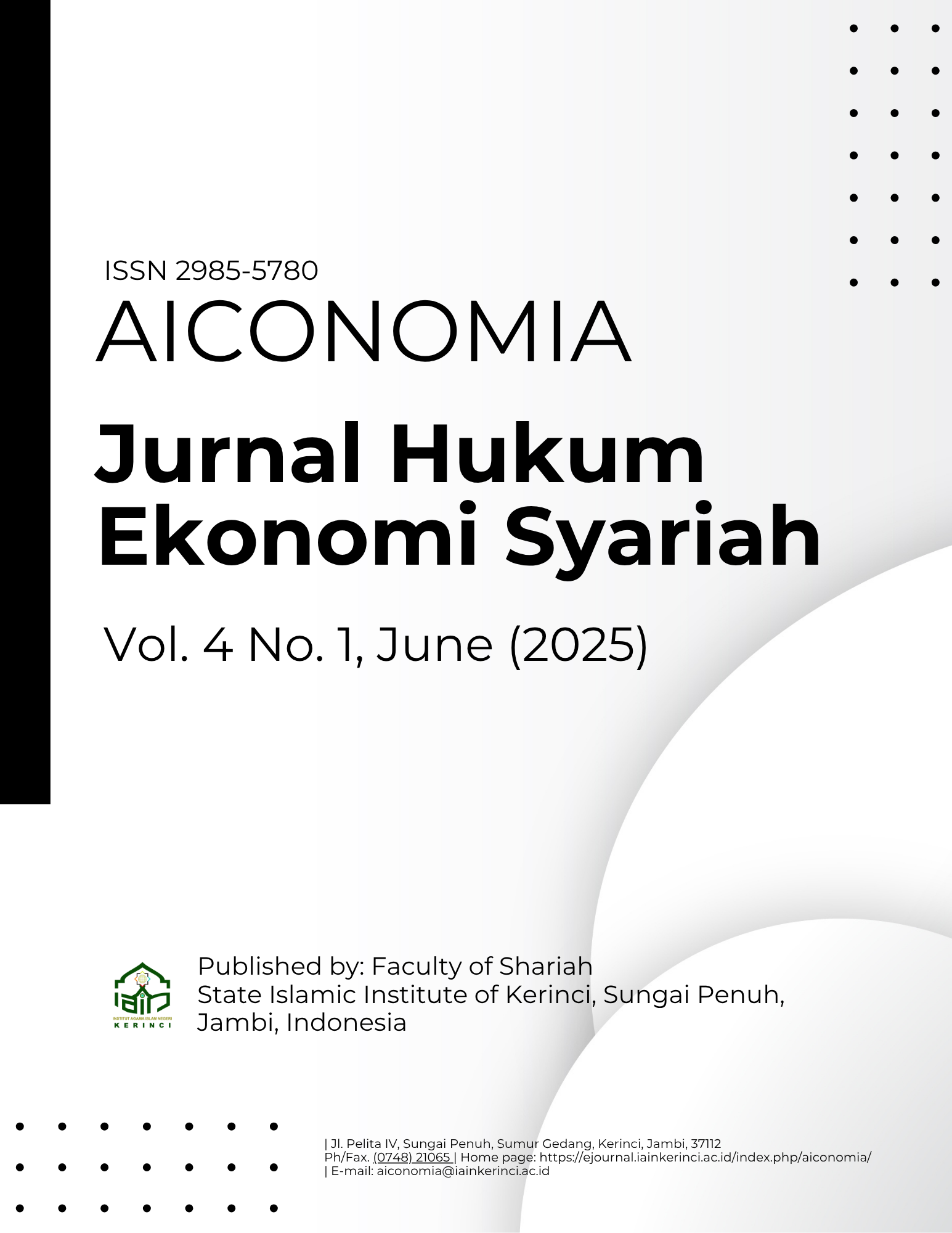Komodifikasi Kesalehan: Kosmetik Halal, Brand Islam, dan Identitas Muslimah Indonesia
Abstract
Halal cosmetics in Indonesia have experienced rapid growth, driven by increasing consumer awareness of sharia compliance, ethical lifestyle, and spiritual identity. This study aims to explore how religious symbols are represented and commodified in the marketing and consumption of halal cosmetics by Muslim women in urban Indonesia. Using the theoretical framework of Brand Islam combined with gender performativity theory, the research applies visual content analysis and critical discourse analysis to promotional materials from Wardah, Emina, and Safi (2021–2025), supported by interviews with Muslim women consumers and secondary data from regulatory institutions. The findings show that halal cosmetics function as tools for expressing modern religiosity, aesthetic aspirations, and identity formation among middle-class Muslim women. However, the study also reveals ethical dilemmas in religious branding, particularly regarding transparency and the potential reduction of piety into market symbolism. These insights contribute to the broader discussion on the intersection of faith, consumer culture, and the halal economy.
Downloads
References
Abd Rahman, A., E. Asrarhaghighi, dan S. Ab Rahman. “Consumers and Halal Cosmetic Products: Knowledge, Religiosity, Attitude and Intention.” Journal of Islamic Marketing 6, no. 1 (2015): 148–163. https://doi.org/10.1108/jima-09-2013-0068.
Awan, H. M., Siddiquei, A. N., & Haider, Z. (2015). Factors affecting Halal purchase intention – Evidence from Pakistan. Asia Pacific Journal of Marketing and Logistics, 27(1), 98–114. https://doi.org/10.1108/APJML-01-2014-0008
Badan Pengawas Obat dan Makanan Republik Indonesia (BPOM RI). Laporan Tahunan Pengawasan Kosmetika. Jakarta: BPOM RI, 2021.
Bourdieu, Pierre. Distinction: A Social Critique of the Judgement of Taste. Cambridge, MA: Harvard University Press, 1984.
BPJPH. “BPJPH: Produk Kosmetik Wajib Bersertifikat Halal pada Oktober 2026.” Diakses 25 Mei 2025. https://bpjph.halal.go.id/detail/bpjph-produk-kosmetik-wajib-bersertifikat-halal-pada-oktober-2026.
Brenner, Suzanne. “Reconstructing Self and Society: Javanese Muslim Women and ‘the Veil’.” American Ethnologist 23, no. 4 (1996): 673–697.
CNBC Indonesia. “Raih Sertifikat di 1998, Wardah Pimpin Pasar Kosmetik Halal.” CNBC Indonesia, 13 Desember 2018. https://www.cnbcindonesia.com/news/20181213184137-8-46312/raih-sertifikat-di-1998-wardah-pimpin-pasar-kosmetik-halal.
DinarStandard & Salaam Gateway. State of the Global Islamic Economy Report 2022. Global Islamic Economy Report, 2022.
El-Bassiouny, N. (2014). The one-billion-plus marginalization: Toward a scholarly understanding of Islamic consumers. Journal of Business Research, 67(2), 42–49. https://doi.org/10.1016/j.jbusres.2013.03.010
Fischer, J. (2011). The halal frontier: Muslim consumers in a globalized market. Palgrave Macmillan.
Fischer, Johan. “Branding Halal: A Photographic Essay on Global Muslim Markets.” Anthropology Today 28, 4. (2012): 18-21.
Hasan, Noorhaidi. “The Making of Public Islam: Piety, Agency, and Commodification on the Landscape of the Indonesian Public Sphere.” Contemporary Islam 3, no. 3 (2009): 229–250.
Inkwood Research. Indonesia Halal Cosmetics Market Forecast 2023–2030. Boston: Inkwood Research. Diakses 15 Mei 2025. https://www.inkwoodresearch.com/reports/indonesia-halal-cosmetics-market/?srsltid=AfmBOooANu2TdzW2q2L44a2bMF cf3vEEfTq9lVZxl3yozBiwy2czeaE.
Jamal, A. (2003). Marketing in a multicultural world: The interplay of marketing, ethnicity and consumption. European Journal of Marketing, 37(11/12), 1599–1620. https://doi.org/10.1108/03090560310495375
Kantor Nasional Ekonomi dan Keuangan Syariah (KNEKS). Master Plan Industri Halal Indonesia 2023–2029. Jakarta: KNEKS, 2023.
Kantar Worldpanel Indonesia. Indonesia Beauty Trends 2023. Kantar Report, 2023. Diakses 15 Mei 2025. https://www.kantarworldpanel.com/id/News/Indonesia-Beauty-Trends-2023
Kompas.com. “Gaet Shireen Sungkar sebagai Brand Ambassador, Safi Indonesia Perkuat Komitmen Perawatan Kulit Halal dan Teruji.” Diakses 15 Mei 2025. https://lifestyle.kompas.com/read/2024/10/22/192337820/gaet-shireen-sungkar-sebagai-brand-ambassador-safi-indonesia-perkuat.
Kontan.co.id. “Wardah Perkuat Posisinya sebagai Pelopor Merek Kosmetik Halal dengan Kampanye ‘Halal dari Awal’.” Kontan.co.id, 3 April 2023. https://pressrelease.kontan.co.id/release/wardah-perkuat-posisinya-sebagai-pelopor-merek-kosmetik-halal-dengan-kampanye-halal-dari-awal.
Lewis, Reina. Muslim Fashion: Contemporary Style Cultures. Durham: Duke University Press, 2015.
Lindsey, Timothy, and Helen Pausacker, eds. Religion, law, and intolerance in Indonesia. Routledge, Taylor & Francis Group, 2016.
LPPOM MUI. Database Produk Halal dan Sertifikasi Ulang. 2023.
Mahmood, Saba. Politics of Piety: The Islamic Revival and the Feminist Subject. Princeton: Princeton University Press, 2005.
Nilan, Pamela, dan Michelle Mansfield. “Youth Culture and Islam in Indonesia.” Wacana Journal of the Humanities of Indonesia 15, no. 1 (2014): 1–18.
Ngah, A. H., Zainuddin, Y., & Thurasamy, R. (2017). Adoption of halal supply chain among Malaysian halal manufacturers: an exploratory study. Procedia Economics and Finance, 35, 683–690.
Putri, Amanda Devina, dan Novi Indriyani Sitepu. “The Influence of Digital Marketing, Halal Awareness, and Brand Experience on Interest in Buying Safi Skincare among Syiah Kuala University Students.” International Journal of Kita Kreatif, Februari 2025. https://doi.org/10.24815/ijkk.v2i1.39287.
Sandikci, Özlem. “Researching Islamic Marketing: Past and Future Perspectives.” Journal of Islamic Marketing 2, no. 3 (2011): 246–258.
Shirazi, Faegheh. Brand Islam: The Marketing and Commodification of Piety. Austin: University of Texas Press, 2016.
Slama, Martin. Practising Islam through social media in Indonesia. Indonesia and the Malay World, 46 (134), (2018): 1–4. https://doi.org/10.1080/13639811.2018.1416798
Slama, Martin. “Social media and Islamic practice: Indonesian ways of being digitally pious”. Digital Indonesia: Connectivity and Divergence, edited by Edwin Jurriens, Singapore: ISEAS Publishing (2017): pp. 146-162. https://doi.org/10.1355/9789814786003-015
Statista. “Revenue of the Halal Cosmetics Market in Indonesia from 2018 to 2022, with a Forecast until 2032.” Diakses 15 Mei 2025. https://www.statista.com/statistics/1451145/indonesia-halal-cosmetics-market-revenue/
Tuba, S., & Hamid, A. B. A. (2016). Halal cosmetic product selection among young Muslim females. Journal of Islamic Marketing, 7(4), 493–507. https://doi.org/10.1108/JIMA-10-2014-0066
Wardah Beauty. “Wardah Philosophy.” Diakses 15 Mei 2025. https://www.wardahbeauty.com/en/philosophy.
Wilson, J. A. J., & Liu, J. (2011). The challenges of Islamic branding: navigating emotions and halal. Journal of Islamic Marketing, 2(1), 28–42. https://doi.org/10.1108/17590831111115222
Wilson, J. A. J. (2014). Islamic marketing – A challenger to the classical marketing canon? Journal of Islamic Marketing, 5(2), 94–105. https://doi.org/10.1108/JIMA-01-2013-0008
Zubaida, Sami. Beyond Islam: A New Understanding of the Middle East. London: I.B. Tauris, 2011.
Copyright (c) 2025 Dini Astriani

This work is licensed under a Creative Commons Attribution 4.0 International License.










